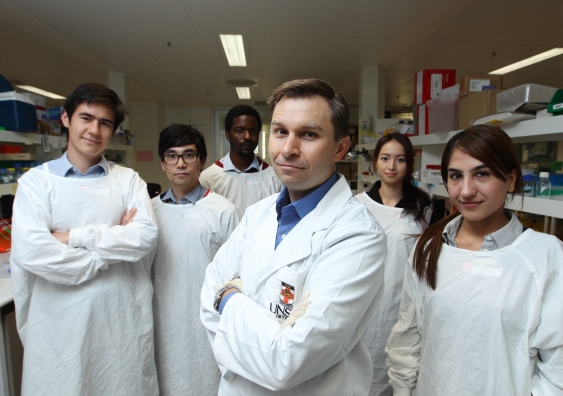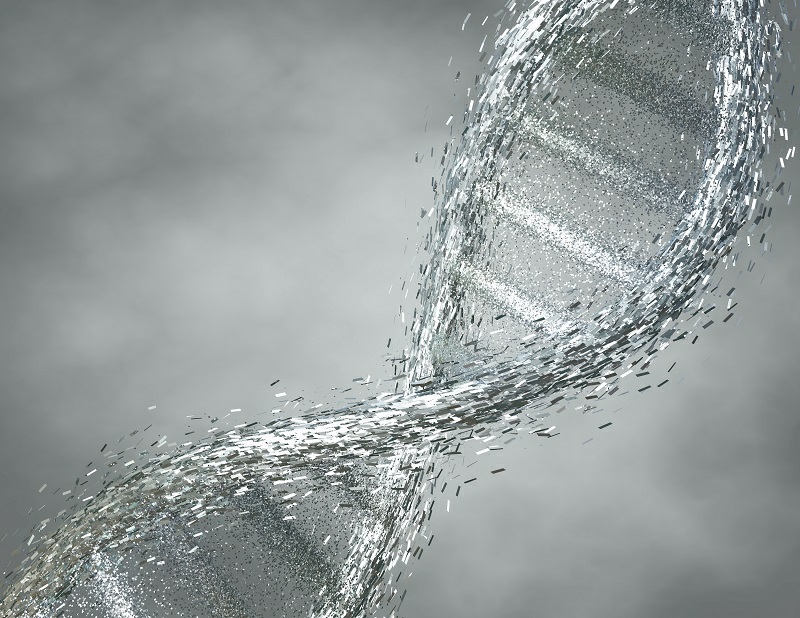Dr. David Sinclair, Discoverer of Anti-aging NAD Fad, Speaks About Human Trials of NMN
Summary: Using NMN as a NAD-boosting anti-aging drug is one of the hottest lifespan extension topics of 2017. This article highlights the August 2017 interview with David Sinclair, the scientist who discovered that the fountain of youth molecule, NAD has remarkable rejuvenating effects on mice. The career of David Sinclair follows a link between sirtuins, resveratrol, NAD-boosting anti-aging compound nicotinamide mononucleotide (NMN), and calorie restriction. [This article first appeared on the LongevityFacts website. Author: Brady Hartman]
Professor David A. Sinclair, Ph.D. has discovered what may be the fountain of youth. The Australian geneticist with the UNSW School of Medical Sciences and Harvard Medical School reported that by boosting NAD, a naturally-occurring compound found in our bodies, he was able to reverse DNA damage and turn elderly mice into energetic young ones.
That’s all fine and well for mice, but when will clinical trials show that NAD-boosting NMN is safe and effective for us humans?
An August interview with Dr. David Sinclair plus a little investigative digging sheds light on the subject.

NAD-boosting NMN Repairs DNA
In March of this year, a team led by David Sinclair announced they had repaired DNA damage caused by radiation exposure or old age by feeding mice a week course of the NAD-boosting compound nicotinamide mononucleotide (NMN). In human terms, it was the equivalent of a 60-year-old’s cells and muscles transforming into those of a 20-year-old. In the March 24th UNSW press release announcing the finding, Professor Sinclair said
‘The cells of the old mice were indistinguishable from the young mice after just one week of treatment,’
The announcement was nothing short of stunning. DNA damage is a significant cause of the diseases of old age such as cancer, flagging energy, Alzheimer’s and a myriad of other age-related conditions. Our cells routinely repair DNA, but that capability declines with age. NAD is naturally found in our bodies but decreases with age. High levels of NAD protect the DNA repair process in mice. Indeed, it seems as if Dr. Sinclair had discovered the fountain of youth when he declared
“This is the closest we are to a safe and effective anti-aging drug that’s perhaps only three to five years away from being on the market if trials go well.”

NAD and NMN – A Murine Fountain of Youth
It seems Dr. Sinclair and his team of researchers had discovered the mouse version of the fountain of youth. Nicotinamide adenine dinucleotide (NAD) is naturally present in every cell of our body and plays a role in a myriad of cellular processes, most notably the one controlling DNA repair. NAD keeps our bodies built-in DNA repair machinery working smoothly. However, our NAD levels decline by about 50 percent as we age, which in turn, weakens the body’s defenses against age-related diseases such as diabetes, heart disease, cancer, and Alzheimer’s.
August Interview With Sinclair on NAD and NMN (Part I)
In its September-October 2017 issue, Harvard Magazine (HM), caught up with Dr. Sinclair. A celebrity in the anti-aging field, Sinclair said that NAD supplementation with NMN might mimic the beneficial effects of calorie restriction, a practice that has extended the lifespan in every animal it has been tested in so far, from mice to monkeys. Having asked Dr. Sinclair about the science backing NAD supplementation, HM wrote
“Sinclair believes that a compound found in all living cells, nicotinamide adenine dinucleotide (NAD), could be used to mimic these effects [of calorie restriction] in humans without the starvation or decreased reproductive capacity;”
HM also discussed Sinclair’s plans to test NAD-boosting NMN on humans, saying
“his human trials of a therapy that could increase NAD levels are due to begin this month.“
The HM interview is consistent with the March 24th press release from Sinclair’s UNSW, which stated “Human trials of NMN therapy will begin within six months“ adding “The human trials will begin this year at Brigham and Women’s Hospital, in Boston.”
You’ll read more about these clinical trial plans later on.

NAD Also Rejuvenates the Bodies of Mice
Previous experiments by Professor Sinclair and his team showed that NAD rejuvenated mice and the results were nothing short of miraculous, as Sinclair’s team reported that the treated mice had become rejuvenated. The mice taking the compound regrew a lustrous coat of fur, had improved kidney function and were able to run twice as fast as the untreated aging mice. The muscles of the treated mice looked and behaved like those of a young mouse, as well.
Sinclair Takes NMN As Well
With potent rejuvenating properties, no wonder many of us have become converts to the idea of NAD boosting, even Dr. Sinclair is a convert, as HM reported,
“Sinclair has been taking the compound himself for about a year. He’s reticent about that, to avoid sounding like a “kook,” but claims his lipid profile has improved dramatically and he feels generally less fatigued—though he admits this is not scientific.”
Why DNA Repair Declines With Age
Back in March 2017, Sinclair’s team also stated that they found a reason why our DNA repair decreases with age. A significant discovery in its own right; the scientists found that DBC1, one of the human body’s most abundant proteins, binds itself to the protein that is in charge of mending damaged DNA, screwing up the DNA repair process. What’s more, the team found that NAD stops DBC1 and other proteins from getting in the way of DNA repair. Having lower levels of NAD as we age allows DBC1 to interfere with the DNA repair process.
NAD has a broad range of healthful effects in the human body. The compound doesn’t just block DBC1, but it also stimulates sirtuins. Sirtuins are a group of seven proteins that regulate important biological processes. More importantly, sirtuins appear to be important in regulating the aging process.
NAD Mimics Calorie Restriction
Sirtuins, incidentally are also activated during prolonged periods of fasting, in the practice of calorie restriction. In fact, artificially stimulating sirtuins with drugs or other compounds mimic the biochemical effects of calorie restriction. Sirtuins are a family of genes are thought to protect the chromosomes, protect stem cells from being lost, and protect cells from becoming chronic inflammation-producing senescent cells. Sirtuins can be activated by calorie restriction, restricting amino acids or sugar, or by increasing NAD levels.
Related Article: Can We Live to 120 on the Fasting Mimicking Diet?
When a person is undergoing fasting or calorie restriction, the body increases production of Nicotinamide phosphoribosyltransferase (NAMPT), a rate-limiting enzyme essential in the synthesis of NAD. Increasing NAMPT levels may also be a way to increase longevity. NAMPT is also an anti-aging compound of interest, as the ultra-secretive startup Calico Labs announced its intent to explore the molecule’s life-extending potential. Calico Labs stated they have licensed experimental drug compounds called P7C3 analogs which enhance the activity of NAMPT.

Sinclair’s History: Resveratrol and Sirtuins
Before becoming known as the discoverer of NAD as the murine fountain of youth, Professor Sinclair was best known for his advocacy of resveratrol as an anti-aging dietary supplement and potential life-extension drug.
Sirtuins
Sinclair received a Ph.D. in Molecular Genetics from the University of New South Wales in Sydney, Australia. In 1999 he was hired at Harvard Medical School to work in the lab of Leonard P. Guarente, a Massachusetts Institute of Technology professor who studied genes involved in the regulation of aging. While at Guarente’s lab, Sinclair discovered that the protein Sirtuin1 (SIRT1) slows aging in yeast by reducing the accumulation of extrachromosomal rDNA circles. Other researchers working in the lab at the time identified NADH as an essential cofactor for sirtuin function.
Resveratrol Discovery
In 2003, Sinclair learned that scientists at a biotech company called Biomol Research Laboratories discovered that resveratrol could activate sir2, and he collaborated with them to confirm this. Sinclair’s subsequent work led to papers he co-authored and published in the journals Nature and Science in 2003. Dr. Sinclair’s outspoken advocacy for resveratrol as a life-extending compound started a scientific controversy, as many in the research community doubted that this was true. Some scientists doubted that resveratrol even activated sirtuins.
Sirtuins, Resveratrol and Sirtis
In 2004 Sinclair, along with biotech entrepreneurs, founded Sirtris Pharmaceuticals. Sirtris focused on developing Sinclair’s research into activators of sirtuins, work that Sinclair began in the Guarente lab. Sirtris was specifically focused on resveratrol formulations and derivatives as activators of the SIRT1 enzyme.
Work in another lab, done partially funding from Sirtris, found increases in the number of mitochondria in the cells of mice given high doses of resveratrol. Sinclair’s lab continued to work on resveratrol and analogs of it, as well as mitochondria and NADH, all directed to understanding aging and how to prevent it.
Sinclair became famous for making statements about resveratrol such as:
“(It’s) as close to a miraculous molecule as you can find.” Adding, “One hundred years from now, people will maybe be taking these molecules on a daily basis to prevent heart disease, stroke, and cancer.”
GlaxoSmithKline Buyout
Most of the other researchers in the lifespan-extension field were more cautious, especially about what else resveratrol might do in the body and its lack of bioavailability. Sirtris’s initial product was a formulation of resveratrol called SRT501. The company went public in 2007 and was subsequently purchased and made a subsidiary of GlaxoSmithKline (GSK) in 2008 for $720 million.
Although limited human studies have shown that resveratrol is well-tolerated, one clinical study of Alzheimer’s disease patients showed that a daily intake of up to 2 grams produced side effects, including nausea, diarrhea, and weight loss.
In 2010, GlaxoSmithKline suspended a small clinical trial of SRT501, due to safety concerns, and terminated the study later that year. Since then, it seems that GSK has abandoned all efforts to pursue SRT501 and their 720 million dollar investment.
August Interview With Sinclair on NAD and NMN (Part II)
According to Dr. Sinclair, NAD boosting in general, and NMN in specific is the fountain of youth for mice and hold tremendous promise as an anti-aging therapy for humans. So, when will Sinclair test it on humans?
Even though the results of the mice studies show significant potential for nicotinamide mononucleotide, the history of pharmaceutical development suggests that it is too soon to expect that the compound will have the same effect in humans. Repeated experience shows that successful animal experiments are seldom replicated in humans. Time and again, molecules which benefit the health of animals in research studies are later shown not to be helpful to people.
In its recent interview with Professor Sinclair, HM got a chance to ask the Australian geneticist about NMN clinical trials. Paraphrasing Dr. Sinclair, HM stated, that ‘research continues with NMN’ and the compound
“… is poised to be tested in humans: the first stage of the trials of NMN that he[Sinclair] was preparing to begin in August at a Harvard-affiliated hospital will test for NAD increases in the blood; after that, he plans to study NMN’s efficacy in treating diseases.”
However, don’t get excited, just yet.
Follow-Up on Sinclair’s Clinical Trials of NMN
Being a fan of Dr. Sinclair and NAD supplementation, I decided to check clinicaltrials.gov, the official registry of clinical trials. As of this writing, no trials using NMN have been registered by Dr. Sinclair’s team. It seems that clinical testing of NMN’s effectiveness for anti-aging purposes has been put off. Not even a measly phase 0 trial to test for NAD level increases.
Bottom Line: Given the fact that Sinclair has described NAD supplementation as a drug with tremendous potential, I’m disappointed he hasn’t registered a single clinical trial of a drug that could be the fountain of youth for the human race.
Other Clinical Trials of NMN
Disappointed by Sinclair’s tardiness in setting up clinical trials for NMN, I was pleased to discover that another research group had taken up the task of testing nicotinamide mononucleotide’s anti-aging properties. In May of this year, Samuel Klein, MD of Washington University School of Medicine in St. Louis registered the clinical trial titled “Effect of NMN (Nicotinamide Mononucleotide) Supplementation on Cardiometabolic Function.” Klein and his Japanese colleagues are testing NMN Supplementation in what looks to be a phase 1 trial with a group of 50 volunteers. With regards to testing nicotinamide mononucleotide supplementation for anti-aging purposes, it seems that researchers from the ‘show me state’ have gotten the jump on Dr. Sinclair. According to the trial description in clinicaltrials.gov,
“…the investigators will evaluate the effect of NMN on how well (a) the hormone insulin works to control blood sugar, (b) the body produces insulin, and (c) blood vessels dilate (get wider). The investigators will also look at the effects of NMN on blood lipids; body fat and liver fat; and other blood, fat tissue and muscle tissue markers of cardiovascular (heart) and metabolic health. “

Importance of DNA Repair
DNA damage, if not repaired, is a significant cause of the diseases of aging such as declining energy levels, cancer, chronic inflammation and a host of other diseases. Unfortunately, our body’s natural DNA repair mechanisms decline with age. Boosting our DNA repair mechanisms could help us ward off the chronic illnesses of old age, such as flagging energy levels, chronic inflammation, and cancer. If NAD boosting with NMN supplementation repairs human DNA, it could be one of the greatest anti-aging and disease-preventing inventions of all time.
That’s why it’s essential to test NMN on human DNA in clinical trials as soon as it’s feasible.
You can learn more about how DNA damage causes diseases and aging, the importance of DNA repair and ways to protect your DNA in a related article.
Related Article: How Our Damaged DNA Kills Us
Bottom Line
Accumulating DNA damage is one of the principal causes of the diseases of old age. NMN is a very promising compound that could potentially boost DNA repair mechanisms in humans. While NAD supplementation holds promise as the fountain of youth, caution is warranted. More often than not, promising compounds have shown spectacular results in lab animals only to be a flop, or even worse, harmful to humans. Clinical trials are required to show if a treatment is safe and effective for its intended use. Hopefully, Washington University’s clinical trials of the compound will be successful and show that NMN supplementation helps us slow down the conditions of old age.
Related Articles on Sirtuins and NAD
- Old Human Cells Rejuvenated with ‘Breakthrough’ Anti-Aging Discovery – Sirtuin activating resveratrol analogs rejuvenate old human cells.
- (Video) Can These Revolutionary Technologies Beat Aging in Our Lifetimes? -Explains the potential of stem cells, senolytics, and sirtuin-activating NAD compounds.
- (Video) Genes Rule Over Our Aging Bodies – Watch Dr. David Sinclair explain the rejuvenating benefits of sirtuin-activating NAD compounds.
- Revolutionary Technologies to Beat Aging – Explains more about NAD, stem cells, senolytics, rapamycin and gene therapy.
- Dr. Sinclair reports that NAD-boosting NMN reverses aging in veins and arteries and restores muscle strength of aging mice in a new study.
Help Us Spread the Word
Please share this post on your social media page and help us spread the word. All it takes is one simple click on any of the social media links on this page.
References & Additional Resources
Cover Photo and the 2nd and 3rd photos of Dr. Sinclair are screenshots from Serious Science. The Mitochondrial Theory of Aging-Professor David Sinclair. (Video). Serious Science. Youtube. 2014. Available Online.
Jun Li, Michael S. Bonkowski, Sébastien Moniot, Dapeng Zhang, Basil P. Hubbard, Alvin J. Y. Ling, Luis A. Rajman, Bo Qin, Zhenkun Lou, Vera Gorbunova, L. Aravind, Clemens Steegborn, David A. Sinclair. A conserved NAD+ binding pocket that regulates protein-protein interactions during aging. Science. Mar 24, 2017 : 1312-1317. Available Online.
Schultz, Michael B., et al. Why NAD(+) Declines during Aging: It’s Destroyed. Cell Metabolism, Volume 23, Issue 6, 965 – 966. 2016 Jun 14. doi: 10.1016/j.cmet.2016.05.022. PMID: 27304496. Available Online.
Marina N. Bolotnikova. Anti-Aging Approaches. Harvard Magazine, September-October 2017 Issue. Retrieved 29 Sep. 2017. Available Online.
U.S. National Library of Medicine. Clinical trial number NCT03151239 for “Effect of NMN (Nicotinamide Mononucleotide) Supplementation on Cardiometabolic Function.” Available online at ClinicalTrials.gov
David Ewing Duncan. “The Enthusiast.” August 15, 2007. MIT Technology Review. Available Online.
J Couzin. “Scientific community. Aging research’s family feud.” 27 February 2004. Science. 303 (5662): 1276–9. PMID 14988530. doi:10.1126/science.303.5662.1276. Available Online.
Benjamin Wallace. “An MIT Scientist Claims That This Pill Is the Fountain of Youth.” 2016. New York Magazine. Available Online.
Liu Y, Ma W, Zhang P, He S, Huang D; Ma; Zhang; He; Huang. “Effect of resveratrol on blood pressure: A meta-analysis of randomized controlled trials.” March 2014. Clinical Nutrition. 34 (1): 27–34. PMID 24731650. doi:10.1016/j.clnu.2014.03.009. Available Online.
Hausenblas HA, Schoulda JA, Smoliga JM; Schoulda; Smoliga “Resveratrol treatment as an adjunct to pharmacological management in type 2 diabetes mellitus-systematic review and meta-analysis”. August 2014. Molecular nutrition & food research. 59 (1): 147–59. PMID 25138371. doi:10.1002/mnfr.201400173. Available Online.
U.S. National Library of Medicine. Clinical trial number NCT00920556 for “A Clinical Study to Assess the Safety and Activity of SRT501 Alone or in Combination With Bortezomib in Patients With Multiple Myeloma.” Available online at ClinicalTrials.gov
Turner RS, Thomas RG, Craft S, van Dyck CH, Mintzer J, Reynolds BA, Brewer JB, Rissman RA, Raman R, Aisen PS; Alzheimer’s Disease Cooperative Study “A randomized, double-blind, placebo-controlled trial of resveratrol for Alzheimer disease.” (2015). Neurology. 85 (16): 1383–91. PMC 4626244. PMID 26362286. doi:10.1212/WNL.0000000000002035. Available Online.
U.S. National Library of Medicine. Clinicaltrials.gov. (Online Clinical trial Registry). U.S. National Library of Medicine. Accessed 29 Sep. 2017.
Disclaimer
Diagnosis, Treatment, and Advice: This article is intended for educational and informational purposes only and is not a substitute for professional medical advice. The information and opinions provided herein should not be used during any medical emergency or for the diagnosis or treatment of any medical condition. Supplementation with nicotinamide mononucleotide (NMN) is an experimental treatment which has not been approved by the US FDA. Experimental therapies carry a much higher risk than FDA-approved ones. Consult a licensed and qualified physician for the diagnosis and treatment of any and all medical conditions. Call 911, or an equivalent emergency hotline number, for all medical emergencies. As well, consult a licensed physician before changing your diet, supplement or exercise programs. Photos, Endorsements, & External Links: This article is not intended to endorse organization, companies, or their products. Links to external websites, mention or depiction of company names or brands, are intended for illustration only and do not constitute endorsements.

14 Replies to “Dr. David Sinclair, Discoverer of Anti-aging NAD Fad, Speaks About Human Trials of NMN ”
Comments are closed.